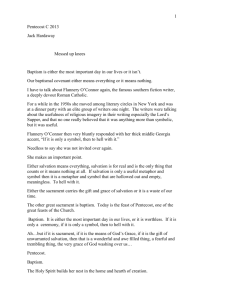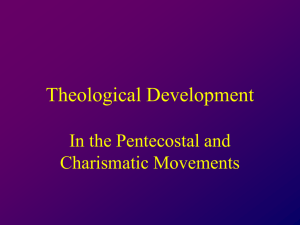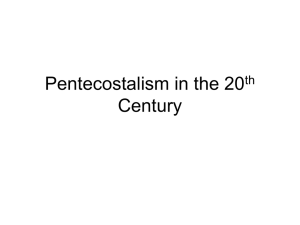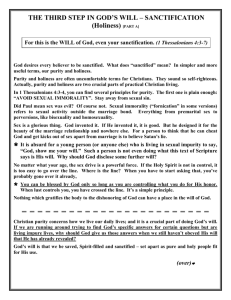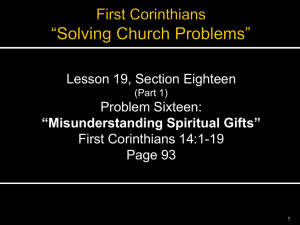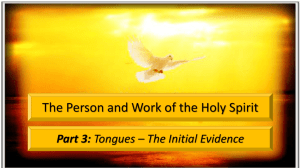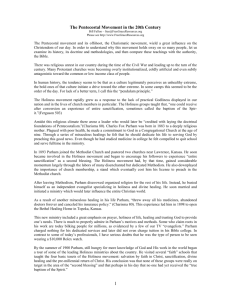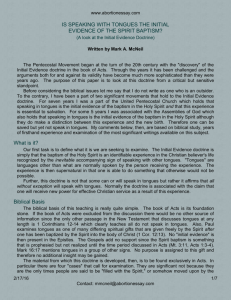05 Pentecostalism — Charismatics and missions
advertisement
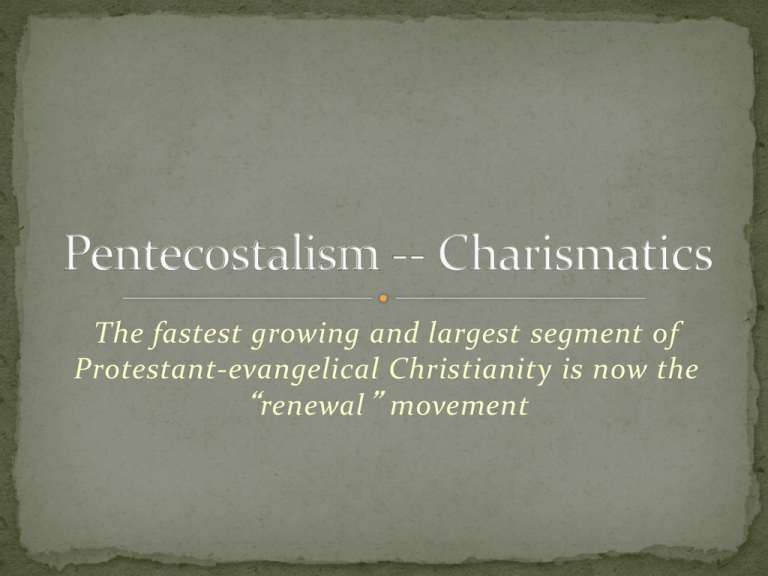
The fastest growing and largest segment of Protestant-evangelical Christianity is now the “ renewal ” movement The quest for the pure church practice has motivated many to reject the institutional church and practice spiritual manners and seek spiritual experiences or phenomena Montanus (mid 2nd cent), in central Turkey or Phrygia, declared himself to be the Paraclete, incarnation of the Spirit. Spoke in ecstatic visions and urged fasting and praying His prophecies superseded and fulfilled the Bible doctrines A few scattered references through the Dark Ages from mystics entering a trance would speak in a babbling Augustine said “tongues” disappeared quickly Camisards or Jensenites (French Prophets) (1705) believed the prophecy of Joel was fulfilled in their day– voices from heaven spoke to them Rejected doctrine of justification but held a mystical experience of their soul with their Creator Moved to England and influenced the Shaker movement and Anabaptist Spiritualists movement Shakers under Ann Lee practiced ecstasy in dancing, trances, loosing control of themselves and speaking in strange languages though non-orthodox Edward Irving (1830) in England, sought the restoration of all spiritual gifts including apostleship and tongues (Irving did not speak in tongues so could not become an apostle in his own church!) National Camp Meeting Association for the Promotion of Christian Holiness, “that all would realize together a Pentecostal baptism of the Holy Ghost” 1867 Holiness movement rooted in John Wesley’s theology 1. 2. 3. Prevenient Grace – drawing a sinner to God – “assisting grace” if yielded to Convincing Grace – evidenced by repentance to salvation, but must continue on to sanctification or lose this grace, thus holiness becomes essential to salvation Second Work of Grace – instantaneous higher power He defines sin as a willful decision to sin – sins of omission are not considered sin. 4. 5. Progressive entire sanctification: without progress you lose it Glorification is contingent upon progress in stages of sanctification Charles Finney (1792-1875) and Revivalism (1792- 1820) – Second Awakening – Gave the bazaar practices to meetings Denied original sin (only conscious disobedience is sin), Armininian, salvation in 3 stages Holiness Movement mostly based on Finney Claimed the Second Work of Grace was the Baptism of the Spirit, and was essential for sanctification Salvation was seen as the result of sanctification which was only possible through the power baptism of the Spirit The Holiness Movement was trans-denominational Universal quest for the Baptism of the Spirit for power to be holy Doctrine came from Methodist, but practice came from American frontier, open air revivalism Following the Civil War the movement sought to bring America back to moral foundations Anyone who could gather a crowd and be persuasive Before the Civil War there were 4,000 itinerating evangelists – after the War, there were 1,000 evangelists Began preaching at 15, married at 19, started a “healing home” in Topeka, Kansas –believed he had been healed from rheumatic fever Sought to know the latest truths of the Latter Day Rain Movement on a sabbatical Returned to Topeka to find he had lost control of his healing home, so he started Bethel Bible School by faith, without tuition New Years service, Jan 1, 1901,after the small group was fasting and praying for the baptism of the Spirit, Agnes Ozman was the first to speak in “tongues” This was the first linking of seeking the baptism of the Spirit and speaking in tongues Its origins began on New Years, 1901, in Topeka, KA, then spread to Azusa Street Mission (Revival) in Los Angeles in 1904-06 Parham moved from Topeka to Houston where he taught his new doctrine William Seymour, a one-eyed African-American was allowed to listen from another room Seymour was invited to a small mission in a poor section of Los Angeles, where his preaching sparked a revival that changed Christianity until the present Many believed the tongues were literal languages to evangelize the world, but discovered they were babble The Assemblies of God (AG) were formed in 1914 Period of Ostracism (1920-1960) by other evangelicals Charismatic movement launched Pentecostalism on the world April, 1960, Father Dennis Bennett, Rector of Episcopal Church of Van Nuys, CA, announced he had spoken in tongues Taught that all the gifts were operative for church today Now the miraculous gifts became the goal of the baptism, and effective ministry – rather than sanctification Spring, 1966, laymen of Duquesne Univ., Pittsburgh, spoke in tongues to begin the Catholic Charismatic Movement Catholics have grown beyond the Protestant Charismatics Catholics interpret their experience as ratification of the Catholic doctrine The focus on an emotional style of worship to lead to feeling the presence of God is becoming the norm pentecostal_bedlam Peter Wagner , 1983, described the Third Wave of the Holy Spirit , which is part of the Charismatic movement – Also the Vineyard Movement This movement incorporates the Latter Rain Movement, Manifest Sons of God teaching and Kingdom Now and Dominion Theology (to be discussed in the SLSW movement next week) and the Apostolic Renewal Movement This movement identifies the baptism of the Spirit with salvation without a second work of grace experience Their emphasis is on the ongoing manifestations of the Spirit (tongues may or may not be emphasized). Most Third Wave leaders do not usually speak in tongues The emphasis is on miracles, prophecy and demonic conquest Worship is central, spiritual disciplines, visions, voices, etc. Key leaders are John Wimber, Paul Cain, Bob Jones, Mike Bickle http://www.youtube.com/watch?v=WDBRgZP7ul8 The new Subjective Hermeneutic displaces the grammatical-linguistic-historical principles Four areas of focus: Narrative-based interpretation over didactic texts Community-based interpretation, what the Spirit gives a congregation through revelations 3. Unlimited reading into a passage the interpreter’s background or subjective experiences 4. Mediating-based interpretation which assumes a vast common ground between cessationists and noncessationists for unity and acceptance 1. 2. To discuss any biblical text an agreed upon hermeneutic is essential, and now that is nearly impossible! Jesus’ promise of “further truth” is a license for unlimited revelations A variety of views are held, but all teach a 2nd work of grace or post-conversion enduement is necessary Variety of views on glossolalia as a sign of Spirit Baptism Tongues is the traditional Pentecostal/Charismatic sign Some special gift manifestation esp. healing or miracles Desire to worship and serve Jesus Unique manifestations are special signs: “slaying in the Spirit,” levitating, filling teeth, laughing uncontrollably, jerking, going unconscious, continual jumping or holding up arms, dancing for hours, reading people’s minds, foretelling their future. "I do wish to issue a warning about the dangers of a 'charismatic sympathy' position that remains open to the possibility of noncessationism. All it takes for a local church or a Christian college or seminary to become totally noncessationist is for the leadership to become "charismatic sympathizers." Recent evangelical history has taught that. An institution does not have to be pro-noncessationist to move in that direction. All it has to do is to have 'Open But Cautious' leaders, members, or students, and over time, noncessationism will leave its mark on that body." Nothing “big” is possible without Pentecostal support “Open, but cautious” view eventually becomes pro Pentecostal 60-70% of Latin American evangelicals are charismatic Growing at 8.1% -- 50% higher than evangelical 5.4% From 0 to 523 million+ in 100 years! They are the boldest, most evangelistic, unashamed, confrontationalist Christians today They exercise their faith in bold testimony to God’s power over the impossible without hesitation. Dead orthodoxy can never replace a vital relationship Scripture is alive and real Gifted leadership must lead Knowledge cannot replace brotherly love Emotions must be led by truth, but truth must not suppress emotions Human efforts cannot replace the work of the Spirit All Christians need to be aggressive in proclaiming the gospel People need to participate in worship Christians need higher level of commitment
